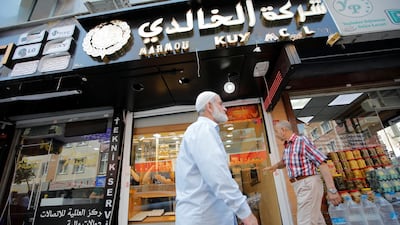A crackdown on unregistered migrants in Istanbul has led to more than 6,000 arrests in the past two weeks, Turkey's interior minister said on Wednesday.
There was concern in recent days about reports that hundreds of Syrian refugees – forced to sign consent forms in Turkish that they did not understand – had been sent back to their country.
Interior Minister Suleyman Soylu denied the claims and said some Syrians were choosing to go home "voluntarily" to areas where fighting has abated.
"We have been carrying out an operation since July 12... We have caught 6,122 people in Istanbul, including 2,600 Afghans," Mr Soylu told broadcaster NTV.
He said Syrians were part of the detained group but did not give a breakdown of the figure.
"When we catch Syrians who are not registered, we send them to refugee camps," he said, citing one such camp in the Turkish border province of Hatay.
Turkey has more than 3.5 million Syrian refugees – the highest number in the world.
Most have "temporary protection" permits but these restrict them to the province in which they were registered. The current crackdown is aimed at those who live in Istanbul without a permit to stay in the city.
On Monday, the authorities in Istanbul set a four-week deadline for Syrians there to return to the provinces where they are registered or be forcibly removed.
The crackdown followed two clashes in the city earlier this year when crowds attacked Syrian properties. The arrests were orchestrated by the Istanbul governor's office, which is controlled by the central government in Ankara.
Most Syrians live in southern Turkish provinces near the border but Istanbul has the largest Syrian population of any region in the country.
The arrests come after the recent defeat of President Recep Tayyip Erdogan's AKP party in the Istanbul mayoral election. Some had argued that the presence of refugees in the city hurt the ruling party's popularity.
The governor's office says there are 547,000 Syrians registered in Istanbul.
A survey published this month by Kadir Has University in Istanbul revealed growing hostility towards Syrians, rising from 54.5 per cent of respondents in 2017 to 67.7 per cent in 2019.

